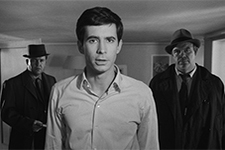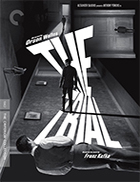The Trial (4K UHD)
|  The Trial (Le Procès) was the first feature Orson Welles wrote and directed after Touch of Evil (1958), the nightmarish film noir that turned out to be his final hurrah with the Hollywood studio system. Welles had been operating primarily as an independent filmmaker-in-exile since the late 1940s, but Universal’s brash re-editing of Touch of Evil was the final straw, and Welles never looked back. Welles was approached by father-and-son producers Michael and Alexander Salkind (the latter of whom would later be known in the U.S. for producing the Superman films with Christopher Reeve in the late ’70s and early ’80s). They proposed that he adapt and direct a film from a list they had produced of literary classics in the public domain. The only one that interested Welles was Franz Kafka’s paranoid masterpiece The Trial, which was technically unfinished, having been published posthumously in 1925 (perhaps Welles was attracted to it because he felt an affinity for unfinished work, having left so much of it himself over the years). Most of the film’s production was done in Yugoslavia, but the money dried up quickly and Welles was forced to find ways to finance the production himself, primarily by moving the production to Paris and shooting in the deserted Gare d’Orsay train station. The result is a singularly unique—though somewhat flawed—literary adaptation that mixes the modern and the baroque with an escalating sense of fearful hysteria underscored by luminous black-and-white imagery by first time cinematographer Edmond Richard (who would go to shoot Luis Buñuel’s final three films). Welles makes ample use of canted angles and long tracking shots to accentuate both expansive, wide-open spaces and small, tightly enclosed rooms with low ceilings, all of which produce feelings of paranoia and vulnerability—the film seems to be about the surrender of the human body to space. It takes place in a world of heavy shadows and strangely flashing lights, where dull, modern offices coexist with large, ornate government buildings that look like abandoned cathedrals. The story takes place in an unnamed dystopian country where a seemingly ordinary man named Josef K. (Anthony Perkins in one of the few good roles offered to him post-Psycho) is accused of a crime that is never named. He spends most of the film trying to clear his name (or at least make some sense of what he is being accused of), shuffling through a bureaucratic nightmare of papers and proceedings (Welles himself plays a bed-ridden attorney whose nymphomaniac mistress seduces Josef). The Trial doesn’t always make sense, but, then again, it’s not supposed to. Its fictional despotic regime mixes elements of democracy and totalitarianism, with Josef K. bitterly complaining about the trampling of his civil rights to police officers who simply materialize in his bedroom one morning and riffle through all his belongings without a search warrant and refuse to tell him of what crime he’s being accused. Perkins is quite effective as the harried protagonist, exuding as he does a kind of innocence that is tinged with a slight twist of inner menace. The central dilemma of the story is that we never know for sure whether or not Josef K. is innocent or guilty—and neither does he. What we do know, however, is the power of Welles’s stunning imagery. An elaborate tracking shot of an enormous office space filled with endless rows of hundreds of workers banging away on typewriters (one can see the influence on Terry Gilliam’s Brazil) ... Josef K. running through a complex system of hallways where the walls are only cage-like horizontal slats ... Josef K. being seduced by the mistress (Romy Schneider) and falling backward in slow motion into an enormous pile of books. All of these highly stylized moments are memorable shards of a complex, sometimes maddening excursion into a world of utter frustration that shows Welles coming close to achieving the heights of artistry that were all too often kept just out of his reach by the limits of time and resources.
Copyright © 2023 James Kendrick Thoughts? E-mail James Kendrick All images copyright © The Criterion Collection | |||||||||||||||||||||||||||||
Overall Rating: 


 (3.5)
(3.5)


